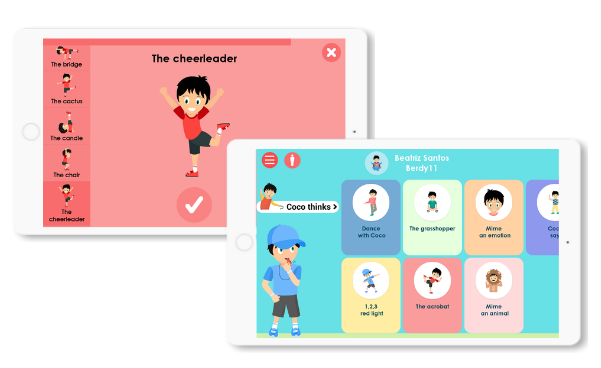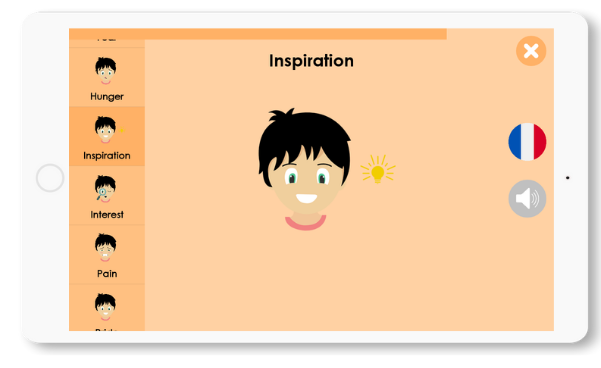Every parent wants to be proud of their children’s early accomplishments: “My child started walking when he was 9 months” or “My child started speaking when he was 1”. Parents are also time-poor, and often reliant on screens to do some of the childminding.
The COCO app is a ready-to-use adaptive learning platform working without Wi-Fi that allows teachers to stimulate the children through fun and attractive games. Plus, with 3 levels of difficulty, each game can be adapted to the children’s level in the different learning areas.
Games to develop essential skills
COCO’s educational games help children work on their vocabulary, language, and mathematical skills, for example. With the COCO app, you will develop the children’s knowledge with our trivia quiz, improve their vocabulary with the Brain Storm game, where they have to put back in order famous sayings, or their language with Syllabus, where they have to make up words from given syllables. You will also work on their logic with Snowball Effect or Tangram.
Physical activities to fight against screen addiction
The COCO app includes a sports break where, every 15 minutes of screentime, children are asked to do at least one physical exercise. It has several positive impacts: it helps children detach from devices, to discourage screen addiction, and also combats sedentary behaviour.
The children will learn to acknowledge their own body and the space around them by following COCO’s movements, for example, by dancing with the little coach or doing some yoga. These exercises are perfect to take an active break from all the learning they are doing in class and clear their minds.

Helping those with special needs
Each child is different which is why a teacher must give different techniques and tips on how to learn and acquire certain skills. In order to include children with learning disabilities, like dyslexia, dyscalculia or ADHD, each game includes audio description and hints to allow everyone to use the COCO program. Moreover, the app only includes encouraging messages to invite the children to keep learning and exercising.
Learning social skills, such as recognising emotions, is really important in a child’s development. It is even more important for children with developmental disorders such as autism or Down Syndrome. Which is why the COCO app includes certain games that have been adapted for special needs children. Recognising emotions is a common game when working with children with autism. However, doing it on a tablet is much more fun and motivating for them. In the game Mime an emotion, the child will learn to recognise emotions such as fear, hunger, pride, and serenity.
ADHD children live in a frenetic world and for them to sit or focus takes a lot of effort. With COCO they can take a break from the world around them and do structured activities at the same time. For example, in the game 1,2,3 red light, the child has to move to the music and stop when the music stops. This requires concentration and adapting to external stimuli.
Note that there are technical sheets for teachers on how to use the COCO app for each cognitive disorder.

The app can be used at home, during therapy or at school, as a group activity or for one-on-one use. Special prices available for 10, 20, 50 or more schools.
To learn more about COCO app and see pricing, visit them on EdTech Impact: https://edtechimpact.com/products/coco-thinks-and-coco-moves.
As an educator, knowing the students and families I work with is essential as a child-centred approach is at the heart of what I do. This is why I identify with the MARIO Framework—it is an evidence-informed practice which has the students’ well-being and progress at its core. Equally, it helps practitioners and students by providing a scaffold for support classes, small groups, and individual student sessions. It clearly complements the work which is happening in the mainstream classroom through focusing on skills and knowledge whilst allowing students to become efficient, resilient, and reflective.
Hoping to empower educators with the knowledge of how to prepare young people with SEND for life beyond the classroom, Renee illustrates the methods they use at West Lea to ensure their students are as fully equipped as they can be for the next chapter of their lives and able to thrive once they leave school.
Emilie-Kate Kidd (pictured above), cofounder of Earwig Academic, trustee of SEN charity Parents in Need and parent to an SEN child, talks about the surprises within the Rochford Review and what its recommendations mean for SEN teaching…

My first take on 'special needs' is: Don't all students have special needs? Aren't we beyond the cookie cutter education that lines students up and feeds them from the same trough?
Yes and yes, but for the purposes of this article, I'm going to reign my pen in and discuss what we traditionally consider 'special needs' and technology's effect on those students who function outside of the normal bell curve of pedagogic expectations.

A community-driven platform for showcasing the latest innovations and voices in schools
Pioneer House
North Road
Ellesmere Port
CH65 1AD
United Kingdom